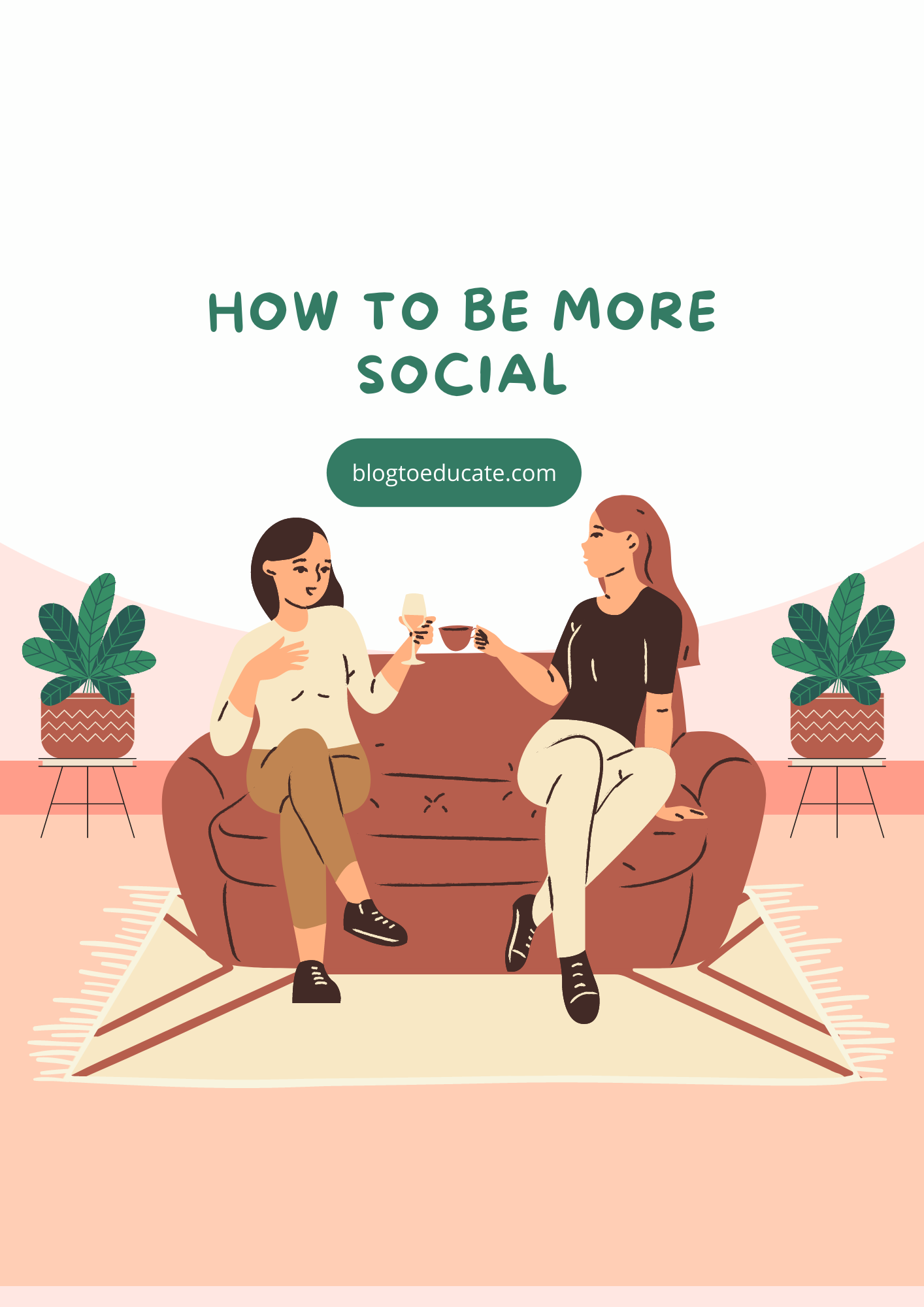There are different queries being searched regarding social activeness. These queries include: how to be more social, how to be social, how to be social in school, how to be social professionally etc. This article will elaborate on different strategies to answer these queries. One must know that being social is an essential ability that can assist us find success both as individuals and as professionals. It necessarily requires the capacity to interact with others, form healthy relationships, and communicate effectively. Some people, however, find it hard to deal with social situations and establish new connections.
There are different techniques through which one can develop socializing skills. These include understanding ourselves, gaining confidence, expanding our social circles, nurturing relationships, and overcoming obstacles can all help us improve our social skills. Furthermore, strong interpersonal abilities, being a good listener, expressing gratitude, and being real and open-minded can all aid in the development of stronger relationships.
Developing the skills regarding “how to be more social” can improve one’s mental and emotional health. It is a well-known saying that people always remember how you made them feel. Therefore, by being more sociable, we may have a positive influence on others, build significant associations, and thus can lead a more fulfilling life.
Understand Yourself:
Understanding yourself is an important factor regarding ” how to be more social”. It can help build confidence, set goals, and improve social skills by understanding your strengths and weaknesses. You can better understand yourself by:
- Assessing your social skills and weaknesses can help you focus on improving your weaknesses while building on your strengths.
- Identifying interests and passions can help you find like-minded individuals and groups to socialize with.
- Understanding your comfort level in different social settings can help you choose social situations that are more conducive to building meaningful relationships.
So, understanding yourself is a key step in becoming more social and building fulfilling relationships. It helps to boost confidence, recognize social skills and shortcomings, and to set attainable socializing objectives.
Gain Confidence:
Being confident is vital to interact with others efficiently since it enables one to meet others to start a conversation. Confidence can be enhanced in by following ways:
- Accept yourself for who you are and recognize your strengths and weaknesses, instead of focusing on your flaws, to build confidence.
- Practice positive self-talk to build confidence and reframe negative thoughts into more positive ones.
- Setting achievable goals for socializing can help build confidence by starting small and choosing events that feel manageable.
- Building confidence takes time and effort, so don’t be discouraged if you don’t feel confident right away. So, be patient.
Hence, increase your confidence by embracing who you are, engaging in constructive self-talk, making realistic objectives, and exercising patience when trying to make new friends.
Improve social skills:
You may increase your comfort and confidence in social situations by developing your social skills. The following are suggestions for enhancing social skills:
- Active listening is an essential social skill that involves paying attention, asking questions, and showing genuine interest in the other person’s thoughts and feelings.
- Effective communication requires both verbal and nonverbal skills, including clear speech, eye contact, and body language.
- In order to better understand and interact with others, learn to read nonverbal cues like gestures, tone of voice, and facial expressions.
- Practice relaxation techniques, challenge negative thoughts, and gradually expose yourself to social situations to manage social anxiety.
- Small talk is an important skill for socializing, so practice asking open-ended questions, sharing personal anecdotes, and finding common ground.
- Attending social events with friends or family can help you practice socializing in a more formal setting.
So, practice and patience are necessary to improve social skills and become more confident.
Expand your social circle:
Attending social events with friends or family can help you meet new people and build relationships.
- Join clubs or groups based on your interests to meet like-minded individuals and practice socializing.
- Social media can be used to connect with others who share your interests, such as joining Facebook groups, following hashtags, and joining online forums.
- Volunteering is a great way to meet new people and give back to your community.
- Take classes to learn new skills and meet new people.
- Be open-minded when meeting new people, not limiting yourself to people who look or act like you.
- Follow up with new people to stay in touch.
So, Follow these tips and expand your social circle.
Overcome difficulties in being social:
Overcoming obstacles is essential for becoming more social, and here are tips to help overcome them and become more social.
- Identifying the obstacle is key to overcoming it, as it can help you work towards overcoming it.
- Setting small, achievable goals can help stay motivated and focused.
- Taking care of yourself is essential for success, such as getting enough sleep, exercising, eating healthy foods, and practicing relaxation techniques.
- Seek support from friends, family, or a professional to develop coping strategies and build confidence.
- Challenge negative thoughts by questioning their validity and replacing them with positive affirmations.
- Practice social skills such as active listening, assertiveness, and body language to feel more confident.
- Take small steps towards your goals and gradually increase your level of socializing as you become more comfortable.
So, identifying obstacles, setting goals, practicing self-care, seeking support, challenging negative thoughts, and practicing social skills can help you become more social and live a more fulfilling life.
Find common grounds:
Finding common ground such as hobbies or interests with others can help to build a connection and foster a sense of belonging. Here are tips for becoming more social.
- Be open-minded and eager to try new things in order to meet people who share your interests.
- Asking questions can help you get to know others and discover common ground.
- Share your own experiences to help others get to know you and discover common ground.
- Attend events related to your interests or hobbies to meet like-minded people and discover common ground.
- Volunteering is a great way to meet new people and discover common ground.
- Join social media groups related to your interests to connect with others who share similar interests.
- To create connections and encourage a sense of belonging, be open and hospitable to others.
So, find common ground and build connections and become more social by being open-minded, sharing experiences, and being inclusive.
Effective Communication:
Communication is essential for appropriate socializing because that allows you to convey your ideas and thoughts, attentively, and establish positive connections.
- Avoid using complex language when speaking, instead use simple language and be direct.
- Nonverbal communication, such as body language and tone of voice, can convey more meaning than words. Maintain eye contact, smile, and use appropriate gestures to show engagement.
- Empathy is essential for effective communication, as it helps to understand and share the feelings of others.
- Show respect for the other person’s ideas and opinions, even if they don’t agree with you.
So, improve your social skills and relationships by practicing effective communication skills by listening as much as speaking.
Give Compliments:
Compliments can help build trust, strengthen relationships, and boost self-esteem when done genuinely and appropriately.
- Be precise: Be clear about what you admire or value when complimenting someone. Try a more particular compliment, such as “Your dress looks wonderful today, the colors truly suit you,” rather than something more general like “You look lovely.”
- Be truthful: Compliments should be genuine and backed up with specific reasons, not insincere or exaggerated.
- Be Appropriate: Complements should be appropriate for the situation and person being complimented, not too personal or sexual.
- Don’t go overboard: Compliments can be a great way to connect with others, but it’s important not to go overboard.
- Be Timely: Giving a compliment at the right time can make a big difference, such as when someone does something well.
- Complements can help improve social skills and build positive relationships, but other skills such as active listening, asking questions, and showing empathy should also be practiced.
Practice Gratitude:
Although it is a matter of personal belief and practice, showing gratitude to God can enhance your relationships and interactions with others. These are a few ways that giving thanks to God might make you more sociable:
- Being grateful to God can help you feel happier and more content, which can help you attract others and become more approachable.
- Practicing gratitude to God can help us connect with others on a deeper level and form more meaningful relationships.
- Showing gratitude to God can foster a sense of community and belonging, providing opportunities to meet new people and build social connections.
- Being grateful improves mental health, including reduced symptoms of anxiety and depression, and increased confidence in social situations.
So, giving thanks to God can improve interpersonal relationships and interactions while also fostering positivity, empathy, community, and mental health.
Be polite:
Being polite is essential for effective socializing, as it shows respect, makes others feel valued, and creates a positive atmosphere.
- Employ courteous language: Being nice and respectful can be demonstrated by using words like “please,” “thank you,” and “excuse me.” It conveys your value for them and your appreciation for their time and effort.
- Practice good manners, such as holding doors, offering seats, and saying “bless you” when someone sneezes, to improve how others perceive you.
- Show empathy by listening to others, understanding their point of view, and caring about their feelings and opinions.
- Avoid confrontational behavior by finding common ground and working towards a mutually beneficial solution.
- Politeness is about showing respect for others, regardless of age, gender, race, or status.
So, practicing smiling, good manners, using polite language, showing empathy, avoiding confrontation, and being respectful to improve social skills and make others feel valued.
Practice Smiling:
Smiling is a straightforward but effective method to develop your social abilities and build relationships. These are some explanations for how smiling can make you more sociable:
- Smile to appear more approachable and friendly which encourages others to engage with you.
- A smiling face may put people at ease and create a more friendly atmosphere, which can help make things more comfortable for everyone.
- Smiling is contagious, establishing an encouraging connection that can improve social interactions.
- Smiling can lift your spirits and lessen stress, making you feel more confident and open to social encounters.
- Always smiling can improve your attractiveness, leading to stronger relationships and connections.
So, Smiling is a powerful way to improve social skills and build stronger relationships by being approachable, positive, contagious, and attractive.
Be Open-minded:
Being open-minded is also a key quality for enhancing your social abilities and growing your network of acquaintances. There are various ways to cultivate open-mindedness.
- Try to approach new people and circumstances with curiosity and an open attitude in order to foster open-mindedness.
- Avoid assuming or passing judgment on someone based on their looks or past, and be open to hearing other people’s ideas, even if they don’t agree with your own.
- Moreover, make an effort to look for chances to absorb knowledge from others, whether it is by attending conferences or seminars, reading books or articles, or conversing with those who have diverse opinions.
Conclusion:
In conclusion, having social skills may improve our lives and aid us in achieving success personally and professionally. We may enhance our social abilities and create stronger connections with others by taking measures to better understand ourselves, and increase our confidence. Similarly, through social skills, we can widen our social networks, nurture our relationships, and conquer challenges. Also, we may connect with others more deeply and build connections that are more meaningful by working on our communication skills, listening skills, thankfulness, and open-mindedness.
Although learning to be more sociable can seem difficult at first, it’s crucial to keep in mind that this is a talent that can be acquired and improved with time. We may progressively develop our social abilities and boost our level of confidence in social circumstances by taking little actions. These actions include talking to strangers, organizing social activities, and actively listening. Eventually, we may live better, more meaningful lives and have a beneficial influence on the world around us.






